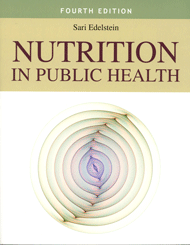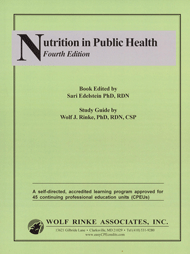|
Nutrition in Public Health, Fourth Edition
| C308 |
45 CPEUs |
HARD COPY |
Currently out of stock.
New inventory coming soon. |
|
Explores the complex, multifaceted array of programs and services that exist in the United States today that are dedicated to bettering population health through improved nutrition. Examines policies, assessment and intervention methods, special populations, food security, and program management.
Share with a friend and Save! Click here for important information about
sharing.
To order an ADDITIONAL Reporting Form click below:
| C308F |
45 CPEUs |
REPORTING FORM |
Currently out of stock.
New inventory coming soon. |
|
Nutrition in Public Health, Fourth Edition
© 2024 Wolf Rinke Associates. All rights reserved for this self-directed accredited learning activity. Reproduction in whole or part without written permission, except for brief excerpts, is prohibited.
LEARNING OBJECTIVES
Upon completion of this CPE program you will be better able to:
- Explain how and why nutrition policies, programs, and practices must be evidenced-based;
- Evaluate the peer-reviewed literature and assess bodies of evidence;
- Assess the strengths and weaknesses of various types of study designs;
- Discuss how to best influence policy;
- Identify the major federal agencies and how they contribute to the practice of public health nutrition;
- Describe the steps to follow when conducting a community needs assessment;
- Compare the types of data that can be collected about a community and how they can best be used;
- Implement various strategies for planning and evaluating community nutrition services;
- Assess and effectively respond to factors that increase nutritional risk;
- Implement short- and long-term intervention strategies for improving dietary behaviors;
- Provide public health nutrition services that will help ensure adequate nutrition for woman, infants, children and adolescents;
- Implement public health nutrition programs that prevent disease and promote adult health;
- Initiate public health programs that address wellness concerns of older adults;
- Identify barriers to providing nutrition services in primary care and recommend strategies for increasing services;
- Recognize the consequences of food insecurity and its relationship to hunger and other health issues;
- Implement strategies that safeguard and secure the food supply;
- Recognize organisms that may be disseminated by ingestion and foods most at risk for intentional contamination;
- Specify major components in an effective grant application;
- Identify major sources for funding public health initiatives;
- Increase effectiveness in staffing, managing, and leading public health nutrition personnel;
- Distinguish between the characteristics of managers and leaders;
- Leverage nutrition education through the public health team;
- Use networks, alliances and coalitions to enhance professional effectiveness;
- Develop marketing skills to more effectively promote nutrition programs and services;
- Recognize how a multidisciplinary approach can enhance public health nutrition efforts.
ABOUT THE AUTHOR OF THE STUDY GUIDE
Kristin Kirkpatrick, MS, RDN is the lead dietitian and manager of Wellness Nutrition Services at the Cleveland Clinic Wellness Institute in Cleveland, Ohio. She is a best-selling author, an experienced presenter, and an award-winning dietitian. Kristin has been seen on both local and national shows such as the TODAY show, NBC Nightly News and the Dr. Oz show, and has contributed to several national newspapers and magazines such as The New York Times, Wall Street Journal, TIME, Runners World, Oprah, Martha Stewart Living, Food Network, Costco Connection, Self and Women’s Health. The Huffington Post named Kristin “one of 35 diet and nutrition experts you need to follow on twitter.” Kristin’s show “The New Rules of Food” began to air nationally on PBS in December, 2017.
Kristin’s career began in Washington, D.C. where she assisted in lobbying efforts for Medical Nutrition Therapy reform on behalf of the American Dietetic Association Policy and Advocacy group. She then went on to become the Regional Coordinator of the Montgomery County, Maryland Hearts N Parks program. During her time with Hearts N Parks, she designed, implemented and measured health promotion programs within the Washington, D.C. metro area. Kristin then returned to Ohio to work for the Cleveland Clinic's Department of Cardiovascular Genetics. She eventually became the lead dietitian in the Cleveland Clinic Wellness Institute.
Kristin is a sought after national speaker on a variety of nutrition and wellness related topics. In addition, Kirkpatrick writes for TODAY.com, the Huffington Post, US News and World Report and is a featured expert on Cleveland Clinic's Health Essentials. Kristin also serves on Dr. Oz’s Medical Advisory Board as well as the Advisory Board for Lose it! In January 2017, Kristin published her first book, Skinny Liver: A Proven Program to Prevent and Reverse the New Silent Epidemic-Fatty Liver Disease.
Kristin has over 17 years of experience in the health management area, holds a MS in Health Promotion Management from American University in Washington, D.C., and a BA in Political Science from the George Washington University in Washington, D.C. She is licensed as a Registered Dietitian in the state of Ohio. In May 2012, Kristin received the Ohio Outstanding Dietetic Educator of the year award and, in 2013, received alumni of the year her high school, Gilmour Academy.
In her free time, Kristin enjoys running, reading, and spending time with her husband Andy, her two sons Jake and Boden and their goats and dogs in their home outside of Cleveland.
Return to the top of page
If you prefer to order by phone, mail
or fax click below
or click here to contact us with
other questions.
For information about our other products and
services return to the sidebar at the top of the page.
|
|
|


